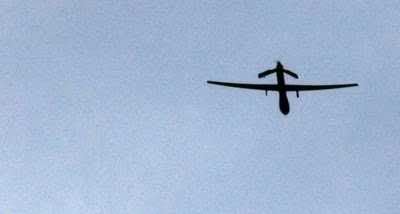
Justifying Drones: How the US Defines ‘War’ Unlike All Others
In December 2013, after a lengthy surveillance period and numerous top secret debates about what to do, a US drone controlled at a location half a world away from Rad’a, Yemen, decimated a wedding party filled with confirmed Al-Qaeda war targets. That’s the US story. http://www.aljazeera.com/indepth/features/2014/03/report-casts-light-us-drone-programme-201431582649552511.html
No other nation-state on the planet agrees with underlying assumptions and definitions of the US story of Rad’a, however. The members of the wedding party were predominately civilians, and therefore the US drone attack killed illegally. That’s the world’s story. http://www.hrw.org/news/2014/02/19/us-yemen-drone-strike-may-violate-obama-policy
A significant source of disagreement between the Rad’a stories arises from the refusal of US officials to explain details of the attack. Without details all must limit their arm-chair reflections to consideration of larger ideas and reasoning, say analysts at HFS.
From the perspective of larger ideas, one stands out as an obvious difference between the US and the rest of the world: The definition of war. To the world’s generally accepted history of international law, all the world is presumed to be at peace except in regions where, by consensus agreement of all nations, a state of hostility exists. Those regions are called war zones. The rules of war apply within these war zones and only within these war zones.
In contrast, to the US the entire world is at war and therefore the rules of war apply across the globe. US President George W. Bush (son of President George H. W. Bush) defined the global war in several speeches, and US President Barack Obama today agrees with that definition, based on his continuation of strategies derived directly from this definition of war.
If the global war view dominates national strategy, it means that all persons supporting that global war become legitimate targets. They are not ‘civilians’ by definition, if the war is global. They are only civilians if one first believes they reside in a place where peace and the laws associated with peace control.
To analysts at HFS, this contrast in fundamental world views accounts for much of how the US and the rest of the world interact.
What do you think?

Another interesting story but I disagree with the following: “In contrast, to the US the entire world is at war and therefore the rules of war apply across the globe.” I’m not sure how this statement can be proven other than it simply expresses an opinion. And it seems as though much of the thrust of the piece is predicated on that opinion.
If you decline to review the 78 hours of footage I reviewed from Pres. George W. Busch and Pres. Barack Obama describing the “global war,” and the six legal analyses from international law scholars I read related to many of those presidential declarations, then perhaps you will not appreciate my distillation of sources into one simple statement. Nonetheless, do your own reading and research to compare and contrast, and I dare you to reach any different fair and balanced conclusion.